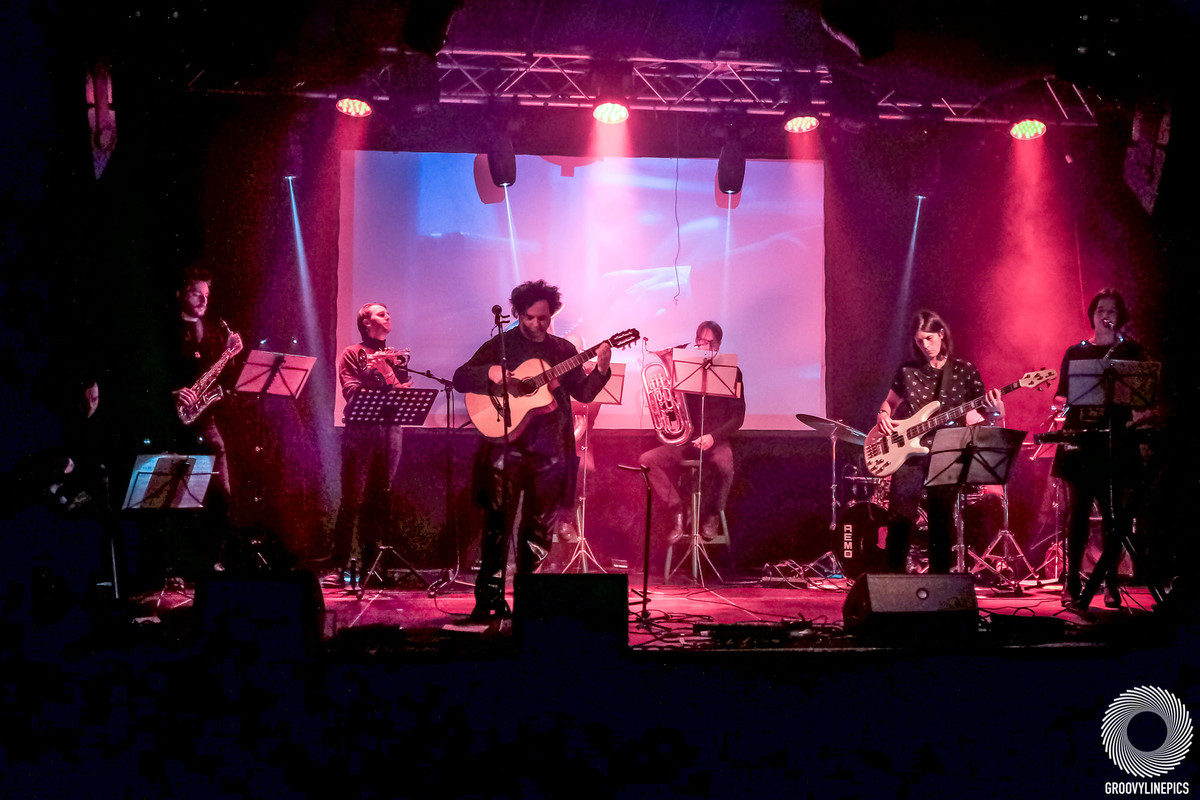
www.facebook.com/profile.php?id=100039203540807
Sounds like: Gothic Rock
From: Belgium
1. How did you get started with music and how did you develop your sound? Who thought of the name "Winterstille" and is there any meaning behind it?
Xavier: Gerry and me both have our own history regarding music. I was interested in music from a very young age. I did two years of music school and tried to learn violin as a child, but this was not a success. With puberty, I thought himself to play guitar. Inspired by new wave and punk, I thought learning to play a few chords was enough to be a musician and refused to take lessons, which is something I now regret. In 2005, I started to perform my songs in different languages in bars and other places.
Gerry: I started playing the cornet at the age of nine. Later, I started playing in local fanfares and brass bands. In 2005, I started my own musical ensemble, called Crooniek. We started by covering songs like ‘Sweet Child O’Mine’ from Guns & Roses and popular music like Supertramp and The Beatles. But I grew up listening to gothic music. In a way, I always wanted to do something with my two musical loves: brass/fanfare and gothic. It think that with Winterstille, we managed to do so. Just before Winterstille, I started another project with singer-songwriter Olivier Soil, called Olivier & Crooniek, but that’s another story. By the way, in the mean time I released an album under the name Crooniek (www.crooniek.be). This album is titled ‘Trail of Time’ and is a kind of resumé of all the different projects Crooniek has been involved in over time.
Xavier: Gerry and I met as writers for the Belgian gothic online magazine Dark Entries (www.darkentries.be), and of course learned that we were both writing our own music. When Gerry released the CD of Olivier & Crooniek in 2018, I went to the release concert. We discussed if it would be possible to set up a similar collaboration around my songs, and quickly agreed that this was a good idea. At first, we were going to release the music as ‘Xavier Kruth & Crooniek’, in analogy with Olivier & Crooniek. But then we thought that our music was too special to release it under this name. We started thinking about a better name, considered many alternatives, often to find out that there was already a band using that name. It was very important that the name reflected the mood of the music, so we settled for Winterstille, the word for ‘winter silence’, in German, as we thought that would sound well.
2. What do you want people to take away from your music?
Xavier: My motivation in music has always been to reach out to people who feel depressed. I have been suffering from depression from an early age, and I often found consolation in music. Also, depression and psychological problems in general are not an easy subject. It’s difficult to talk about these subjects, but it’s much easier to sing about them. Depressed people often have the feeling that they are all alone with their feelings. By making music about depression, you let them know that they are not alone, that other people feel the same. This is very important to find a way out of your depression, or at least to learn to deal with it.
Gerry: In my opinion, it is important that an album is as diverse as possible. On the album of Winterstille, I strongly believe we managed to do so. The 10 songs are all different in style, tempo, song structure and so on. It makes me feel sad to hear albums that all sound the same, even when a band releases several albums over the years. Bands should try to reinvent themselves, not to copy others and not to repeat themselves.
3. How would you describe your sound to the average listener?
Gerry: Hard to say. I think we have an unique sound. On the one hand, because we use acoustic instruments (also on stage), so people label us as folk. But on the other hand, we enrich the sounds with drums and guitars to give it a gloomier sound, so that leans more towards gothic.
Xavier: Our label boss Wool-E once called it gothfolk, or even ‘orchestral singer-songwriter’. We labelled the CD as a mix of gothic, folk and chanson, which also refers to French chanson. In France, you have what they call ‘textes à thèmes’, which might be translated as ‘lyrics about themes’. It stresses the importance of the lyrics in the songs. The idea of singing in several languages originated with the Swiss singer Stéphan Eicher, who started as a new wave-musician, but evolved towards folk rock and chanson during his career. He always made discs mixing songs in different languages. We are very proud to have made a disc with no less than four different languages: Dutch, English, French and German.
4. Who are three bands you’d like to tour with?
Xavier: I think Gerry and I will quickly agree that Lacrimosa is the band we would want to tour with. But let’s be honest: Winterstille consists of nine musicians who all have a family and regular jobs, so the chances of us doing an international tour are limited, to say the least. But if the chance would exist to tour, we would do everything to do so! As a solo artist, I did tour in Belgium and the Netherlands with my good friend Gert (Kleinpunk), and I would of course do it again. And as you are so kind to ask the question, let’s give an impossible answer about a band that never gave a show and doesn’t intend to do so either. I would like to give a concert with Sopor Aeternus, even if it was only to see Anna-Varney Cantodea performing live for once.
5. How has Covid affected what you do?
Xavier: Unfortunately, COVID has affected our work, yes. We recorded ‘Puin van dromen’ (‘Debris of Dreams’) in the end of 2019, and everything was finished and ready to be released in May 2020. We were in lockdown at the time, and of course no concerts could take place. For a while, we discussed with the label Wool-E Discs what would be the right time to release our album, and then decided to release it anyway in October, as it was unclear when we would finally be able to perform again. I think it was a good decision to release the CD anyway, but the release would have had more impact if we would have been able to do live concerts at the time of the release.
6. What’s your take on the current state of Gothic Rock?
Xavier: Gothic rock is not dead, but it is old. When you attend concerts in the scene, it’s hard to find people who are younger than 40, at least in Belgium. This does not have to be a problem, but I often wonder why young people are not attracted to it. When I was young and started to get fascinated by the gothic scene, I assumed that people living in the margins of society would always be interested in gothic, that new generations would follow up. This has not happened. On the other hand, when I look at young people today, I see a lot of alternative people. It is much easier today to dress differently, to have a strange haircut, piercing or tattoos. That is a good thing, and the gothic movement has contributed to that. In a way, the gothic and punk legacy is there: it’s easier for everyone to express themselves, even if they sometimes feel as strangers or outsiders in this society.
7. What’s the current music scene like locally there in Belgium?
Xavier: We have an interesting gothic scene in Belgium. It consists mostly of older people but produces a lot of interesting music. Our label Wool-E has released a lot of those artists: The Breath Of Life, The Arch, Der Klinke, Lizard Smile … Unfortunately, he has decided to stop his label, so all these bands will be looking for another label soon. That is including Winterstille. Fans of gothic rock would certainly want to check Ground Nero, Your Life On Hold and Dicentra Macrantha (the follow-up project of The Marchesa Casati, a great deathrock band in which I played guitar). And for those who prefer dark ambient, we would like to recommend Empusae and Dead Man’s Hill.
8. What’s your take on the royalties that streaming services pay out to artists?
Xavier: I don’t really have an opinion about that. It is certainly important for people who want to live from their music. I guess it’s very difficult to earn a good living as an artist, so they will tell you that the royalties are not sufficient. As for me, I don’t have the ambition to live from music and I have no financial problems, so I don’t mind if people can stream my music for free on the internet. I would rather want to reach more people than to earn money with music.
9. What’s next for Winterstille?
Gerry: We are very proud of the first album, so we are taking the first steps on creating a sequel for ‘Puin van Dromen’. But it will take some time because we have other projects too. It will sound like Winterstille, of course, but it will also be a step forward exploring new sounds.
10. Any shoutouts?
Gerry: We would like to say thanks for all the support and appreciations on our album. A special thanks is for Dimitri, our label manager who believed in the project from the beginning.

